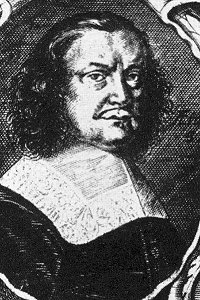Introduction

Born: Brüx, Bohemia (now Most, Czechia).
Died: October 29, 1675, Zittau, Germany.
Buried: Friedhof Kreuzkirche, Zittau, Germany.


Born: Brüx, Bohemia (now Most, Czechia).
Died: October 29, 1675, Zittau, Germany.
Buried: Friedhof Kreuzkirche, Zittau, Germany.

Called the Orpheus of Zittau,
Hammerschmidt was a composer and organist of the early to middle Baroque era. He was one of the most significant and popular composers of sacred music in Germany in the mid-17th Century.
Born to a Saxon father and Bohemian mother, Andreas left Bohemia with his family when they fled the Thirty Years’ War after it had become Catholic. They settled in Freiberg, Saxony, where Andreas must have received his musical education.
Many famous musicians of the early Baroque period spent time in Freiberg, but it is uncertain which of them taught Hammerschmidt. At any rate, he received superb musical training while there.
Hammerschmidt left Freiberg in 1633, through his mentor Stephan Otto, taking a post as organist for Count Rudolf von Bünau in Weesenstein, but he returned to Freiberg the next year as an organist.
He was married shortly after his return there. Three of his six children died in infancy.
In 1639, he left Freiberg again, moving to Zittau, where he succeeded Christoph Schreiber as organist. He remained at this post for the rest of his life.
While musical life in Zittau was severely damaged by the Thirty Years’ War, including the decimation of choirs and general reduction in musical standards, Hammerschmidt survived. After the war ended in 1648, musical life slowly regained its former high standard.
Exact records of Hammerschmidt’s activities in Zittau are spotty, as the documents were burned in 1757 when the Austrians destroyed the city in the Seven Years’ War.
However, during this part of his career, Hammerschmidt became one of the best known composers in Germany, and the most famous representative of the concertato style of the generation after Heinrich Schütz.
While well respected and called on as an expert in many matters, he seems to have been prone to outbursts of rage, some of which involved him in brawls.
He also seems to have profited from his activities as a musician and civic leader, and evidently lived quite well, with a house in town as well as a country estate.